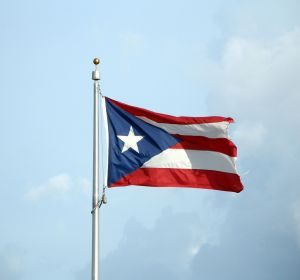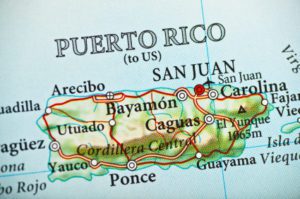 During the mid-20th century, Puerto Rico famously faced difficulties with residents leaving the island in search of jobs and economic opportunity, typically in the United States. In an effort to combat these ‘brain drain’ and population issues, the island, with the cooperation of the United States Federal Government, created numerous tax incentives to help draw businesses and development back to the U.S. territory. This effort was largely regarded as successful and transformed the island and slowed, even halted, the stream of people leaving Puerto Rico. As these incentives expired or were repealed by the mid-1990s, the problems that had faced the island’s inhabitants two generations earlier again rose to the surface.
During the mid-20th century, Puerto Rico famously faced difficulties with residents leaving the island in search of jobs and economic opportunity, typically in the United States. In an effort to combat these ‘brain drain’ and population issues, the island, with the cooperation of the United States Federal Government, created numerous tax incentives to help draw businesses and development back to the U.S. territory. This effort was largely regarded as successful and transformed the island and slowed, even halted, the stream of people leaving Puerto Rico. As these incentives expired or were repealed by the mid-1990s, the problems that had faced the island’s inhabitants two generations earlier again rose to the surface.
Over the past two years governing officials of Puerto Rico have again sought to create tax incentives to entice the wealthy and their businesses to come to the tropical paradise. According to local realtors, the tax incentives have not gone unnoticed by those in the “one percent”. Many project that the island is looking to become similar to Singapore and other booming economies that attract businesses and opportunities for the local people. Here is a breakdown of the differences between the tax laws within Puerto Rico, a U.S. territory, and those within the United States.
Important Definitions
To properly understand how the Puerto Rican tax code is applied, it is necessary to understand how the different types of income and residency are defined and understood by the Internal Revenue Service and the Puerto Rican authorities.
Bona Fide Puerto Rican Resident
The tax laws in Puerto Rico do not apply to just anyone who owns property on the island. To make it possible for U.S. citizens to relocate to the territory and be subject directly to its laws, Act No. 22 was passed in 2012 defining the benefits that new residents would receive. A ‘resident’ of Puerto Rico is defined as an individual who had not lived on the island for fifteen years prior to the passing of Act No. 22, a person who resides on the island for at least 183 days out of the tax year, does not have a tax home outside of Puerto Rico, and does not have a closer connection to the United States or a foreign nation during the tax year.
U.S. Based Income
The Puerto Rican tax laws are only applicable to income that has been secured in Puerto Rico and does not affect U.S. based income, regardless of the residency of the individual. Codes 861 through 865 are used in determining if income is considered to be Puerto Rican based or United States based. For example, dividends that have been paid by a U.S. based corporation are considered U.S. based and are therefore subject to the full federal taxes. Similarly, any income derived from in connection to a U.S. based trade or businesses, even if the trade occurred in Puerto Rico, is considered U.S. based.
Puerto Rican Tax Laws for Individuals
 The biggest and most enticing difference between the tax laws is that bona fide residents of Puerto Rico are not required to pay income tax on revenue earned from within the island of Puerto Rico (non-U.S. based income). They are, however, required to file a return and report all income that comes from outside of Puerto Rico. The Act No. 22 that was passed in 2012 also began to offer 100 percent exemption for residents of the island from long term capital gains, interest, and dividends taxes. It is important to note, however, that Puerto Rico does have a separate internal tax based on income. The freedom from the capital gains tax is a quickly rising incentive for many wealthy citizens who make their money through hedge funds and related investment options, and it is considered one of the driving forces for some of the highest earners in society examining the Puerto Rican prospect.
The biggest and most enticing difference between the tax laws is that bona fide residents of Puerto Rico are not required to pay income tax on revenue earned from within the island of Puerto Rico (non-U.S. based income). They are, however, required to file a return and report all income that comes from outside of Puerto Rico. The Act No. 22 that was passed in 2012 also began to offer 100 percent exemption for residents of the island from long term capital gains, interest, and dividends taxes. It is important to note, however, that Puerto Rico does have a separate internal tax based on income. The freedom from the capital gains tax is a quickly rising incentive for many wealthy citizens who make their money through hedge funds and related investment options, and it is considered one of the driving forces for some of the highest earners in society examining the Puerto Rican prospect.
There are also a number of differences regarding deductions and credits. Those who are filing for both Puerto Rican and United States based income must remember that deductions and credit that are applied to Puerto Rican income cannot be counted on the federal return. Also if the taxpayer has their primary home in Puerto Rico and that is the primary home of their children, they cannot claim an earned income tax credit on their tax return. At the same time, residents of the island are responsible for paying into Social Security and thus receive these benefits, but they do not pay into or receive SSI benefits.
Puerto Rican Tax Laws for Businesses
Act No. 73 provides a number of financial benefits for foreign and local companies looking to operate in Puerto Rico, where they have U.S. jurisdiction combined with a separate tax structure. Qualifying businesses will have a 4 percent fixed income tax rate, a 0 or 1 percent income tax rate for pioneering businesses, and a combined floor of 3 percent for local businesses. There are also credits up to USD 5,000 for jobs in Vieques and Culebra, and credits for research and development, locally developed products, energy consumption, and a variety of other deductions.
With the rising taxes on businesses and the highest earners in society, Puerto Rico is quickly catching the attention of many throughout the United States. As a U.S. territory, it has a unique relationship between its taxes owed to the United States government and the local government. The island has made it clear that they are working to use their ability to create their own tax code to appeal to the wealthier members of U.S. society as well as businesses and companies who can all help to boost the local economy. Those who are interested in the prospects offered on Puerto Rico should carefully review the above information to make sure they are familiar with the differences between the United States tax law and the Puerto Rican tax code and discuss their own tax situation with a tax professional.






 Steven N. Klitzner, P.A. is a tax attorney based in Miami, Florida. He has been practicing tax law for over 40 years, and currently holds a 10.0 rating by Avvo. Mr. Klitzner was appointed to the IRS Service Advisory Council in 2021 and is...
Steven N. Klitzner, P.A. is a tax attorney based in Miami, Florida. He has been practicing tax law for over 40 years, and currently holds a 10.0 rating by Avvo. Mr. Klitzner was appointed to the IRS Service Advisory Council in 2021 and is... 





